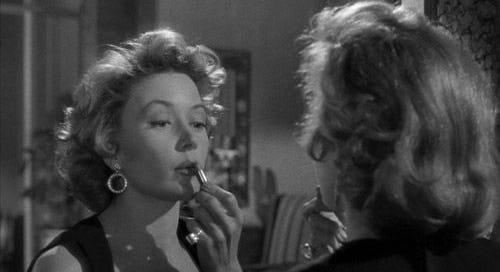Film noir is full of horrific moments. Who knew? There’s Thelma Ritter’s demise in Pickup on South Street (1953), Charles McGraw running over George Murphy in Border Incident (1949), the titular killers coming out from behind the café in The Killers (1946), and pretty much the whole of Phenix City Story (1955). Add to that the famous coffee scene from The Big Heat (1953) and you’ve got yourself a pretty depressing clip montage that you definitely shouldn’t watch before going to bed.
‘I’ve been rich and I’ve been poor. Believe me, rich is better.’ Debby Marsh
Some noir characters are hard to define. They fit into several categories. Or none at all. Some of them just go with the flow. And some of them subvert your expectations. Debby Marsh is one of them. Because the glorious Gloria Grahame plays her to a T, you’d probably expect some sort of femme fatale with a twinkle in her eye and quip on her tongue. And yeah, there’s plenty of that in this. But I personally think Debby Marsh is a heroine, not a femme fatale. I’ve referred to her a femme fatale with a heart of gold in the past, but nope, she’s a full-blown heroine. Hear me out.
Written by Sydney Boehm, based on the William McGivern novel, and directed by Fritz Lang, The Big Heat, the least convoluted of the ‘Big…’ noirs (lookin’ at you, Sleep and Combo!), follows Sergeant Detective Dave Bannion (Glenn Ford) on his quest to take on the big crime syndicate that’s taking over the city, run by Mike Lagana (Alexander Scourby). Everyone’s on the payroll. Everyone’s crooked. Including one Vince Stone, played by Lee Marvin. And of course, his girlfriend Debby Marsh.
‘Six days a week she shops and on the seventh, she rests.’ Vince Stone
Debby Marsh hasn’t had an easy life. One gets the feeling she grew up poor, on the wrong side of the tracks perhaps, wishing she could escape that hellhole. So when the opportunity presented itself, she took it. Even if that meant having to look at Lee Marvin’s terrifying face every day. She shops, she drinks cocktails, she wears expensive perfume… she also takes a beating from him from time to time. Probably more often than she’d like to admit. But she’s content with what she’s got. Why? It’s more than she’s ever had. She knows she’s never going to be happy with him, but right now? Well, in her own words, he’ll do.
After the film’s big tragedy about forty minutes into it, she and Bannion form an unlikely friendship and she asks him about his wife. Her interests, hobbies, personality… It’s a bittersweet moment and we end up feeling sorry for both of them. And when the coffee scene comes, a few minutes later, it’s both brutal and heart-breaking. Debby didn’t have much to begin with and now she’s got even less than that. And as the light coming through the hotel’s venetian blinds hits her frail figure, with her face hidden in the shadows, in what only be described as a frame to rival any Edward Hopper painting, our feelings for Debby only get deeper. Her face is scarred forever. Her heart is heavy. And her mind is made up. With a gun in her hand, she takes out a key player in this never-ending syndicate, avenging herself, Bannion, his wife and their daughter in the process. Her final moments in the film resonate with us and we realize that we’ve been watching a heroine in action.
‘I guess a scar isn’t so bad. Not if it’s only one side. I can always go through life sideways.’ Debby Marsh
Debby Marsh is one of film noir’s greatest testaments. She’s who film noir is made for. The people who get knocked down time and again, stand back up and got knocked down again. The people who wanted the American Dream and got stuck with… well, they just got stuck. The villains who thought of themselves as heroes, and the nobodies who didn’t know they could be somebody.
We bid farewell to Debby Marsh and The Big Heat. Next week’s loser only wanted to buy his childhood farm following the death of his father. So, naturally, he ended up embroiled in a bank heist. The film is The Asphalt Jungle, the actor is Sterling Hayden and the loser… is Dix Handley.
See you on the sunny side of the street.





A great take on this heroine Carol. Summed it up beautifully. Makes me want to see it again. Anybody who only knows Gloria Graham from” it’s a wonderful life” should definitely see this film.